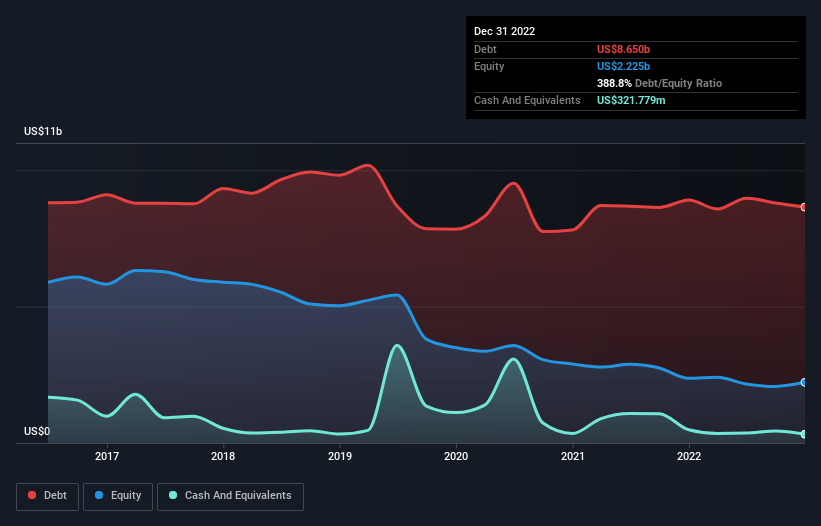- United States
- /
- Healthcare Services
- /
- NYSE:DVA
These 4 Measures Indicate That DaVita (NYSE:DVA) Is Using Debt Extensively

David Iben put it well when he said, 'Volatility is not a risk we care about. What we care about is avoiding the permanent loss of capital.' So it seems the smart money knows that debt - which is usually involved in bankruptcies - is a very important factor, when you assess how risky a company is. We note that DaVita Inc. (NYSE:DVA) does have debt on its balance sheet. But is this debt a concern to shareholders?
When Is Debt A Problem?
Debt assists a business until the business has trouble paying it off, either with new capital or with free cash flow. In the worst case scenario, a company can go bankrupt if it cannot pay its creditors. However, a more frequent (but still costly) occurrence is where a company must issue shares at bargain-basement prices, permanently diluting shareholders, just to shore up its balance sheet. Having said that, the most common situation is where a company manages its debt reasonably well - and to its own advantage. The first thing to do when considering how much debt a business uses is to look at its cash and debt together.
View our latest analysis for DaVita
How Much Debt Does DaVita Carry?
The chart below, which you can click on for greater detail, shows that DaVita had US$8.65b in debt in December 2022; about the same as the year before. However, because it has a cash reserve of US$321.8m, its net debt is less, at about US$8.33b.

How Strong Is DaVita's Balance Sheet?
The latest balance sheet data shows that DaVita had liabilities of US$2.62b due within a year, and liabilities of US$12.1b falling due after that. Offsetting this, it had US$321.8m in cash and US$2.55b in receivables that were due within 12 months. So its liabilities outweigh the sum of its cash and (near-term) receivables by US$11.8b.
This deficit casts a shadow over the US$7.59b company, like a colossus towering over mere mortals. So we'd watch its balance sheet closely, without a doubt. After all, DaVita would likely require a major re-capitalisation if it had to pay its creditors today.
We use two main ratios to inform us about debt levels relative to earnings. The first is net debt divided by earnings before interest, tax, depreciation, and amortization (EBITDA), while the second is how many times its earnings before interest and tax (EBIT) covers its interest expense (or its interest cover, for short). This way, we consider both the absolute quantum of the debt, as well as the interest rates paid on it.
DaVita has a debt to EBITDA ratio of 4.1 and its EBIT covered its interest expense 3.6 times. This suggests that while the debt levels are significant, we'd stop short of calling them problematic. Worse, DaVita's EBIT was down 26% over the last year. If earnings keep going like that over the long term, it has a snowball's chance in hell of paying off that debt. The balance sheet is clearly the area to focus on when you are analysing debt. But it is future earnings, more than anything, that will determine DaVita's ability to maintain a healthy balance sheet going forward. So if you want to see what the professionals think, you might find this free report on analyst profit forecasts to be interesting.
Finally, a company can only pay off debt with cold hard cash, not accounting profits. So it's worth checking how much of that EBIT is backed by free cash flow. Over the most recent three years, DaVita recorded free cash flow worth 75% of its EBIT, which is around normal, given free cash flow excludes interest and tax. This cold hard cash means it can reduce its debt when it wants to.
Our View
To be frank both DaVita's level of total liabilities and its track record of (not) growing its EBIT make us rather uncomfortable with its debt levels. But on the bright side, its conversion of EBIT to free cash flow is a good sign, and makes us more optimistic. We should also note that Healthcare industry companies like DaVita commonly do use debt without problems. We're quite clear that we consider DaVita to be really rather risky, as a result of its balance sheet health. So we're almost as wary of this stock as a hungry kitten is about falling into its owner's fish pond: once bitten, twice shy, as they say. There's no doubt that we learn most about debt from the balance sheet. But ultimately, every company can contain risks that exist outside of the balance sheet. These risks can be hard to spot. Every company has them, and we've spotted 3 warning signs for DaVita (of which 1 doesn't sit too well with us!) you should know about.
At the end of the day, it's often better to focus on companies that are free from net debt. You can access our special list of such companies (all with a track record of profit growth). It's free.
New: Manage All Your Stock Portfolios in One Place
We've created the ultimate portfolio companion for stock investors, and it's free.
• Connect an unlimited number of Portfolios and see your total in one currency
• Be alerted to new Warning Signs or Risks via email or mobile
• Track the Fair Value of your stocks
Have feedback on this article? Concerned about the content? Get in touch with us directly. Alternatively, email editorial-team (at) simplywallst.com.
This article by Simply Wall St is general in nature. We provide commentary based on historical data and analyst forecasts only using an unbiased methodology and our articles are not intended to be financial advice. It does not constitute a recommendation to buy or sell any stock, and does not take account of your objectives, or your financial situation. We aim to bring you long-term focused analysis driven by fundamental data. Note that our analysis may not factor in the latest price-sensitive company announcements or qualitative material. Simply Wall St has no position in any stocks mentioned.
About NYSE:DVA
DaVita
Provides kidney dialysis services for patients suffering from chronic kidney failure in the United States.
Undervalued with proven track record.


